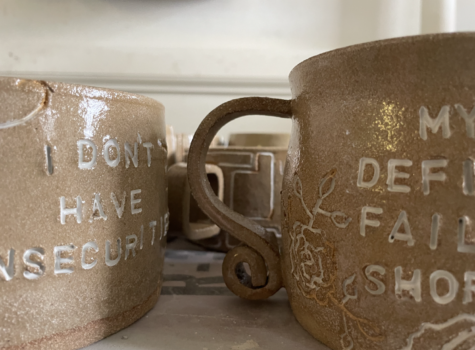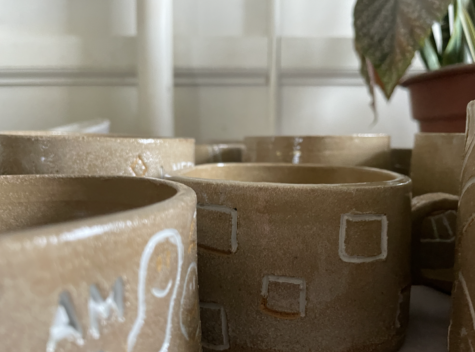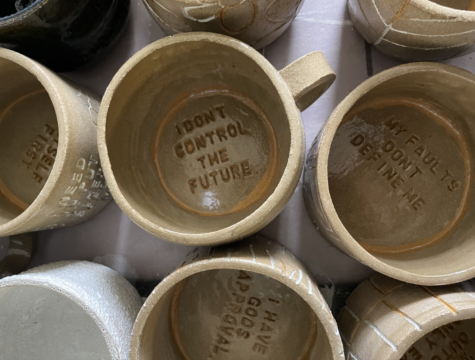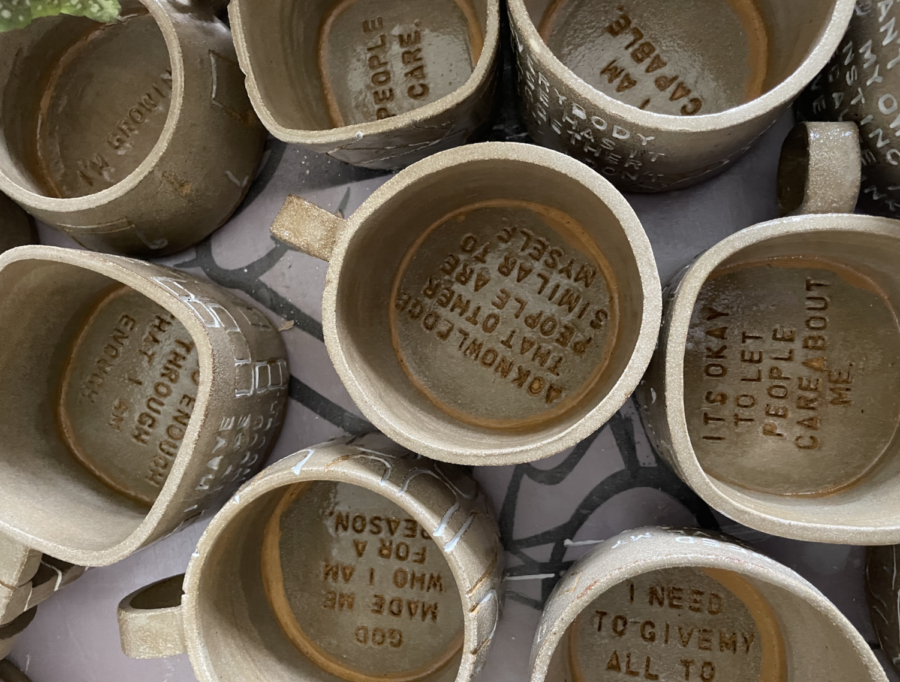“What’s the lie you tell yourself?”: Self-reflection through pottery
‘What’s the lie yourself?’ is a year-long ceramic mug project Iowa State student Sabrina Konchan took exploring other’s identities, experiences and insecurities.
Iowa State student Sabrina Konchan set out on a year-long ceramic mug project in January, exploring the question ‘What’s the lie you tell yourself?’
Konchan, a junior in elementary education and owner of Clay Cactus Designs, specializes in creating custom ceramics and jewelry, a hobby she began after being introduced to pottery during a throwing class in high school.
Creating the concept
The concept of “What’s the lie you tell yourself?” came from a conversation Konchan had on New Year’s Eve with Nathan Bui, an Iowa State alum and Konchan’s boyfriend.
“I was in such a creative rut,” Konchan said. “I was like ‘What am I contributing to society,’ so I wanted to do something meaningful with my art again.”
Konchan and Bui discussed how people set themes for the new year, such as being carefree or setting boundaries, and the question ‘What’s the lie you are telling yourself right now?’ came up.
“I was like ‘How can I make the concept into something tangible?’’’ Konchan said. “So, I was like ‘Okay, I’m going to turn it into a mug.’”
Konchan and Bui’s discussion led Konchan to decide to put the lie an individual tells themself on the outside of the mug and, on the inside, the truth.
Interviews
From January to April, Konchan began the first part of the project: interviewing people.
Konchan planned to complete the project on a smaller scale but later realized she wanted more diversity, leading her to interview 50 people rather than the original 15.

“I had so many meetups in one week sometimes, and it was emotionally just exhausting since they could range anywhere from 15 minutes to two hours,” Konchan said. “It all fell into three questions: why do you feel this way, what can you do to overcome it and how does this impact you?”
Konchan explained that although the interviews were structured on three questions based on the lie individuals tell themselves, she would have to come up with smaller questions and pull on details to get the full story.
“My favorite part was meeting with everybody because it was all different forms of life,” Konchan said. “It was really cool to talk with everybody… and see how vulnerable so many people were.”
Konchan interviewed over 50 people ranging from 18 to 33 years old.
“You have people in different life stages,” Konchan said. “Some people never went to college, and some did go. Some people have kids. Now their stories can be shared and people can be like ‘Okay, I may be this age but relate to this person at this age, and it’s okay to feel this way because I’m not alone.’’’
Designing the mugs
Overlapping with the interview process, Konchan began coming up with designs for mugs from March to late May.
“Coming up with the patterns was hard,” Konchan said. “Each mug pattern represents the person, and I never wanted them to be too similar either.”
Konchan said that since her roommates Nadeja Simon, a junior in kinesiology and health, and Jennifer Robles, a senior in software engineering, have also done ceramics, she would work with them to come up with patterns.
“Some mugs are definitely favored because of the pattern of designs,” Konchan said. “It’s the really fun ones that I got to play around with more, but it’s hard because I had to make sure they still fit everyone’s personality.”
Creating the mugs
Konchan began the process of creating the mugs from May to September.
“During spring break, my boyfriend and I went to get all the clay needed,” Konchan said. “I have an outdoor studio, so I can only work when the weather is nice.”

Konchan completed a majority of the mugs from June to July but faced complications using a kiln and had to re-do some around the time school started. Konchan then went on a road trip with Bui to hand-deliver the mugs to those she created them for.
“Not everybody is in Iowa, so I went on a two-and-a-half-ish week road trip,” Konchan said. “We drove out to the East Coast since I was just too stressed to carry them on a plane.”
Among Konchan’s stops were New York, Pennsylvania and Virginia. Konchan then returned to finish up the last few mugs.
“The weather was not on my side this whole time,” Konchan said. “I could only get four mugs done a day.”
Konchan is currently working on compiling pictures of people with their mugs along with transcribing their interviews before releasing the project onto her Instagram in December.
The end result
“What I was hoping to accomplish shifted; it shifted a lot,” Konchan said. “Originally, I just wanted to share these stories.”
While this goal did not change, Konchan’s decision to only photograph the mugs did.
“I wasn’t going to have people photographed in the pictures and was only going to have the mug itself,” Konchan said. “My original concept was like, ‘Okay, who cares what they look like since it shouldn’t matter.”’

While Konchan still thinks what a person looks like does not matter, she also thought being able to see representation in the form of photography was important.
“I just remember I would feel so awful about myself in high school and be like ‘No one feels this way,’ because no one talks about it,” Konchan said, “and yeah, it’s changing but not fast enough.”
Konchan explained that even reaching one person is enough.
“I’m sharing their stories, and their stories can touch other people,” Konchan said. “How great would it be to just be scrolling and seeing somebody struggling with the same thing you are while looking and feeling like you?”
Konchan shared that being able to see the vulnerability people had going into the project was important, as well as the different journeys everyone was going through.
“One of my friends just texted me and said, ‘That project made me view my life differently and changed me, so thank you for letting me be a part of it,’” Konchan said. “I did not expect it to make such a difference in their lives that much, so that’s just really cool.”
To learn more about Konchan’s project and her work, visit Clay Cactus Designs.
Your donation will support the student journalists of the Iowa State Daily. Your contribution will allow us to purchase equipment, send our student journalists to conferences and off-set their cost of living so they can continue to do best-in-the-nation work at the Iowa State Daily.

















